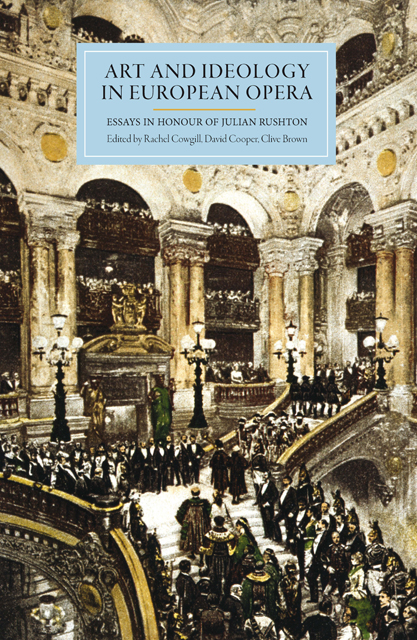Book contents
- Frontmatter
- Contents
- List of Figures
- List of Music Examples
- List of Tables
- Notes on Editors and Contributors
- Acknowledgements
- Introduction
- I Nationalism, Cosmopolitanism and National Opera
- II Opera, Class and the Politics of Enlightenment
- III Opera and Otherness
- Julian Rushton: A Family Memoir
- 7 The Works of Julian Rushton
- Index
- Tabula Gratulatoria
16 - Modernism’s Distanced Sound: A British Approach to Schreker and Others
Published online by Cambridge University Press: 28 February 2023
- Frontmatter
- Contents
- List of Figures
- List of Music Examples
- List of Tables
- Notes on Editors and Contributors
- Acknowledgements
- Introduction
- I Nationalism, Cosmopolitanism and National Opera
- II Opera, Class and the Politics of Enlightenment
- III Opera and Otherness
- Julian Rushton: A Family Memoir
- 7 The Works of Julian Rushton
- Index
- Tabula Gratulatoria
Summary
The old joke about England being das Land ohne Musik might be relevantly recalled for the purposes of this essay. Of course England never was a ‘Land ohne Musik’, although it has had problems about admitting it. Always and everywhere ‘music’ has signified more than an art of organized sounds; it has been nuanced by type and taste, has stood for class, rebelliousness, spirituality, high intellectual seriousness, mindless knees-ups and military might. And then there is self-indulgent ‘femininity’, anxiety about which Byron Adams has identified as an ingredient in Elgar's critical self-image and reception in England. It has similarly coloured the reception of my chosen composer, here, Franz Schreker (1878–1934). If I say that England remains something of a ‘Land ohne Schreker’, it would be to position that historically eclipsed Austrian opera composer as the representative of a kind of music, specifically a kind of twentieth-century music that was regressively tonal, but confusingly modern in its textual, dramaturgical and theoretical affiliations. Richard Strauss, Puccini and Rachmaninov might figure prominently in a roll-call of similar ‘refuses’. Post-Second World War Britain seemed officially even less receptive to such music than the rest of Europe had been by the 1930s, and denigration of it is still more or less automatic – as evidenced by responses to the November 2007 London concert-performance of Korngold's opera Das Wunder der Heliane (1927). Perhaps we should focus the historical blame more directly on that section of the British cultural establishment – comprising media moguls and critics, concert-promoters, publishers and academics – which has always influenced or managed access to the mythically free market- place in which music is consumed. Prominent musicologists like Richard Taruskin have begun more specifically to blame the critical agendas of certain colleagues and forbears like Theodor Adorno.
In the world of what I am now tempted to call ‘Julian Johnson's Classical Music’, elite cultural and academic experts have always sought and played a dominant role in disseminating historical narratives and critical values that they absorbed in their own college or university training.
- Type
- Chapter
- Information
- Art and Ideology in European OperaEssays in Honour of Julian Rushton, pp. 351 - 361Publisher: Boydell & BrewerPrint publication year: 2010



